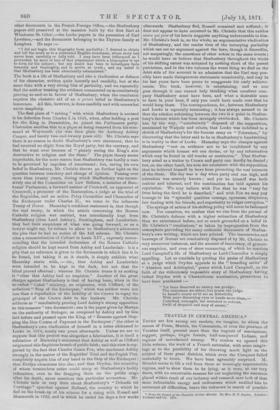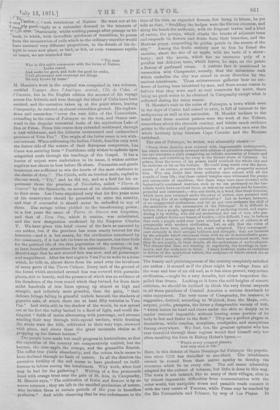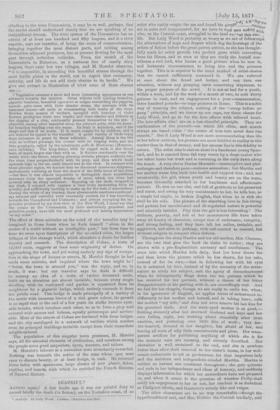TRAVELS IN CENTRAL AMERICA.*
Tarsals are few among our readers, we imagine, to whom the names of Peteu, Merida, the Usumasinta, or even the province of Yucatan itself, present more than the vaguest of associations, suggest, perhaps, virgin forests, half-conquered Indians, and regions of unreclaimed swamp. We confess we opened this little volume, the work of a French naturalist, with seine misgiv- ings as to the possibility of his throwing much light on the subject of these great districts, which even the Conquest failed materially to touch. We have been agreeably surprised. M.. Morelet seems to lift a veil from these so seemingly impenetrable: regions, and to show them to be lying, as it were, at our very doors, with no conceivable reasons for our neglecting the resources placed within reach of our industry and research save lack of that same indomitable energy and enthusiasm which enabled him to surmount all difficulties, brave the unknown in search of possible . h.o.m. the Freud of the Chevalier Arthur dforelet. By Mrs, M. F. Winter. London.: Trlibnor and Co. 11371, .0 over parden,-.; resh revelations of Nature. He went out at his °scat:11'1Y good--thply as a naturalist devoted to the interests of `-..-Yintiusially, whilst reading passage after passage in his book, in which, with incredible quickness of transition, he passes from the enumeration of evils which to the ordinary traveller would have assumed very different proportions, to the details of his de- light in some new plant, or bird, or fish, or even venomous reptile or insect, we are reminded that
" The man Who in this spirit communes with the forms of Nature, . . . . . Looks round, And Reeks for good, and finds the good ho seeks, Until abhorrence and contempt are things He only knows by name."
M. Morelet's work in the original was comprised in two volumes, entitled Voyages dans l'Anie'rique eentrale, rile de Cuba, et l'neatan, but in the English edition the account of his voyage across the Atlantic and tour through the island of Cuba have been omitted, and the narrative taken up at the point where, leaving Campeachy, he entered on almost untrodden ground. his explora- tions and researches " cover the vast delta of the Usureasinta, extending to the ruins of Palenque on the west, and thence east- ward to the singular terrestrial basin of the mysterious Lake of Itze or Paten. From this centre they extended southward, through a vast wilderness, and the hitherto untraversed and undescribed province of Vera Paz." The origin of the latter name is not with- out interest. When addressing the Indian Chiefs, familiar only with the fiercer side of the nature of their European conquerors, Las Cases was assuring them " Providence only wishes to operate upon misguided souls through the teachings of the (gospel. It has a horror of unjust wars undertaken in its name, it wishes neither captives nor slaves to bow before its altars. Persuasion and gentle treatment are sufficient to win the hearts of the most obstinate to the shrine of duty." The Chiefs, with an ironical smile, replied in the one word, " Try," and he did try, and as a field for his ex- periment chose the province of Tuzulutlan, called "Tierra de Guerra" by the Spaniards, on account of its obstinate resistance to their arms. Las Cases stipulated only that for five years none of his countrymen should be permitted to enter the country, and that if successful it should never be enfeoffed to nny of them. The savage tribes yielded to the transforming power ; in a few years the name of Tierra de Guerra was forgotten, and that of Vera Paz, which it retains, was substituted, and the new designation confirmed by the Emperor Charles V. We have given this brief resume of the facts as narrated by our author, but if the province has some scanty interest for the historian--and it is but scanty, for the civilization introduced by the missionary, if it has left its trace ou the manners, has done little for the political life of the thin population of the country—it has at least boundless attractions for the naturalist. Everything M. Morelet says that he saw around him was new, and all picturesque and magnificent. After his first night in Vera: Paz he woke to a scene which, he tolls us, almost drove from his mind even the loveliness of many parts of the Tierra Caliente. Every inch of the ground of the forest which stretched around him was covered with parasitic plants, rich in beauty, and the presence of which was no evidence of the decadence of the trees round which they twined, for from their midst hundreds of tree ferns sprang up almost as high and straight, and infinitely more graceful, than the palm, " their delicate foliage falling in graceful umbels beneath the shadows of gigantic oaks, of which there are at least fifty varieties in Vera Paz." And while still in the shadow of the woods, he saw spread out at his feet the valley bathed in a flood of light, and could dis- tinguish " fields of maize alternating with pasturage, and streams winding their way through wide-spread verdure, while framing the whole were the hills, cultivated to their very tops, crowned with pines, and above these the great mountain chains as if propping up the distant horizon."
The people have made but small progress in horticulture, so that the capacities of the country are comparatively untried, but the banaua, the rose-apple, the orange, and the granadills. flourish. The coffee tree yields abundantly, and the cotton trade seems to have declined through no fault of nature. In all the districts the excessive fertility of the soil seems to have produced an indif ference to labour among the inhabitants. Why work, when food may be had for the gathering ? Writing of a fine promenade lined with orange trees near the gate of St. Ana, in Campeachy, M. Morelet says, " The cultivation of fruits and flowers is by no means common ; they are left to the unaided production of nature, who lavishes them at certain periods of the year in boundless profusion." And while observing that he was unfortunate in the
time of his visit, as regarded flowers, few being in bloom, he yet tells us that, " Studding the hedges were the fibrous cleomese, and along the beach the anthemis, with its fragrant leaves, and a kind of cactus, the petaya, which climbs the trunks of adjacent trees and suspends its flowers and fruits from their branches, and the Mexican poppy, suspending its golden petals in the streets of the city." Among the fruits entirely new to him he found the cacinito, about the size of an apple, with the taste of a straw- berry ; and the anona, which has an unctuous pulp of a peculiar but delicious taste, which leaves, he says, on the palate a flavour of pertained cream. A curious fact is mentioned in connection with Campeachy, namely, that the calcareous rock which underlies the city was mined in every direction by the ancient inhabitants. These subterranean galleries bear no evi- dence of having been inhabited by man, and there seems reason to believe that they were used as vast reservoirs for water, there being no good water to be obtained in Campeachy except what is collected during the rainy season. M. Morelet's visit to the ruins of Palenque, a town which even in the days of Cortez had ceased to exist, is full of interest to the antiquarian as well as the naturalist. M. Morelet inclines to the belief that these ancient palaces wore the work of the Toltecs, somewhere about the eleventh century, and thinks much evidence points to the action and prepouderauce of a common race over the whole territory lying between Cape Catoche and the Mexican tableland.
The site of Palenque, he writes, was admirably chosen
:- "From those heights, now covered with impenetrable undergrowth, but which wore formerly crowned with edifices of primitive magnificence, the eye traverses a plain comprising an infinite succession of forests and savannas, and extending far away to the distant shore of Ciatatatja. Ito prince, from the tower of his palace, could overlook the whole city and its environs as far as the horizon. He could keep watch over the move- ments of an enemy, or survey the course of public prosperity around him. Who can doubt that these solitudes once echoed with all the sounds cf busy life ; that these ruined temples once witnessed the pomps and ceremonies of sacrifices ; that these stops were once crowded with fantastically-costumed warriors, such as we see portrayed on the bas- reliefs whith have survived them, as well as by courtiers and by 'beauties, powerful and celebrated ;—who enn doubt, in a word, that these domains, which have now returned under the sway of nature, once pulsated with the living tide of an indigenous civilization ? Lot us beware, however, of an exaggerated enthusiasm, and let us not over-estimate the skill of the architects of the monuments of the Palonquo ! It is difficult to believe that a people, ignorant of the arts of analyzing sound, and repro- ducing it by writing, who did not understand the use of iron, who pos- sessed neither flocks nor beasts of burden,—it is difficult, 1 say, to believe that such it people could ever have attained a degree of culture at all comparable with modern civilization. Let us add, that the ruins of Palenque have boon, perhaps, too much eulogized. They areonagnifl- cent certainly in their antique boldness and strength ; they are invested by the solitude which surrounds thorn with an air of indescribable gran- deur ; but I must say, without contesting their architectural merit, that they do not justify, in their details, all the enthusiasm of arcbmologists. The ornamental lines are wanting in regularity, the drawings in sym- metry, and the sculpture in finish. I mum., however, make en exception in favour of the symbolical tablets, the sculpture of which struck me SS remarkably accurate."
The beauty and picturesqueness of the country completely satisfied our author ; it seemed as if the place might bo a refuge from all the wear and tear of an old and, as it has since proved, very rotten civilizatiou,—might be a very Arcadia, but closer inspection dis- pelled that dream. Looking at it from the cold heights of remote criticism, we should be inclined to think the very literal serpents in all these paradises of Central America a serious drawback to calm enjoyment. 'rho very name of Campeachy, for instance, is suggestive, derived, according to Waldeck, from the Maya, cain, serpent, petclie, garapata, the latter a disagreeable variety of tick, "which buries its head and claws under the skin so deeply as to render removal impossible without leaving some portion of its body to fret and fester in the flesh." They are a perfect plague in themselves, while roaches, scorpions, centipedes, and mosquitoes throng everywhere. Wo fear, too, the greatest optimist who has ever travelled through these regions would find himself only too often recalling the lines in Bishop Heber's hymn,— " Whore every prospect pleases,
And only man is vile."
Hero, in this district of Santo Domingo del Palenque the popula- tion since 7.752 has dwindled to one-third. The inhabitants cannot be roused from their native apathy to. develop the resources which lie on every side. The soil seems admirably adapted for the culture of tobacco, but little is done in this way. The town is not isolated, like so many of their villages, shut in by almost impassable difficulties from communication with the outer world, but navigable rivers and passable roads connect it with the very centre of 'Yucatan, while Peten may be reached by the Rio Usumasinta and Tobacco, by way of Las Playas. In insignificalmt etreren. The system myste of the Usutuasinta has fin who, on the Cornish coast, struggled to the land ties,
proslion produced by my first view of the New World, I must say that ,
the scenes on the Usimmeinta, by their malanoholy grandeur, and
the public road. T ti
































 Previous page
Previous page